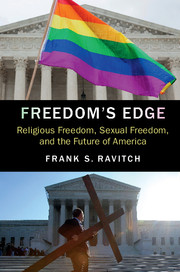Book contents
5 - For-Profit Companies, Shops, and Commercial Landlords
Published online by Cambridge University Press: 05 September 2016
Summary
A central source of conflict between religious freedom and sexual freedom arises in the context of for-profit entities such as shops, closely held corporations, commercial landlords, and many other venues. Prior to the U.S. Supreme Court's decision in Hobby Lobby, it was unclear whether these entities would be protected under the federal Religious Freedom Restoration Act (RFRA). As set forth in Chapter 2, prior to Hobby Lobby there were strong legal arguments that for-profit entities are not protected, or even if theoretically protected, they are not able to experience a substantial burden on religion in the same ways as an individual or a religious entity because of the many constituencies involved in operating and patronizing a for-profit entity.
We no longer live in that world. The Supreme Court's decision in Hobby Lobby makes it clear that today closely held for-profit businesses are protected, at least under the federal RFRA. This is not the end of the discussion, however, because some of the biggest issues that arise in the context of for-profit entities involve religious accommodations that conflict with civil rights and antidiscrimination laws. As I have noted repeatedly, even when a RFRA exists to provide protection for religious freedom, there is no guarantee that all religious freedom claims will be successful. Government may still burden religion when it has a compelling (extremely important) interest and the law that burdens the freedom of religion is narrowly tailored to meet that interest. This issue has been analyzed in several cases; in most of these cases, religious exemptions were denied because the exemption would conflict with antidiscrimination laws. In fact, this is the likely result in most cases involving for-profit entities claiming a right to discriminate under a religious freedom law.
Moreover, many states do not yet have religious freedom laws. In these states, it is possible that any future law could exclude for-profit entities – or at least public accommodations such as hotels, restaurants, and catering halls – from the definition of “person” under the law, which would prevent these entities from being protected. This is the approach I advocate because it supports the passage of state RFRAs, which are often essential to protect religious freedom, while protecting against discrimination in employment, public accommodations, and other services available to the general public.
- Type
- Chapter
- Information
- Freedom's EdgeReligious Freedom, Sexual Freedom, and the Future of America, pp. 76 - 133Publisher: Cambridge University PressPrint publication year: 2016

